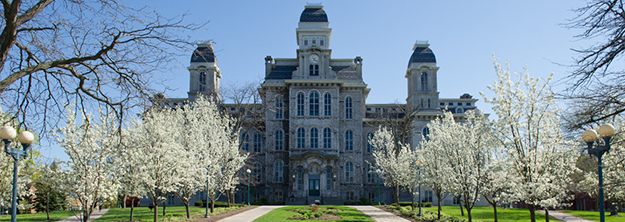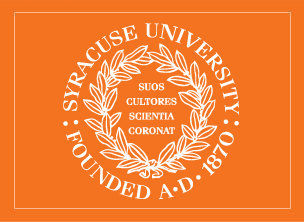
Joseph Darling G'12
It’s plain to see that enzymes excite chemistry doctoral student Joseph E. Darling G’12. When asked to describe an enzyme he’s researching, the Michigan native reacts with the swiftness he relied on as a former high school sprinter and soccer player. “It’s easier to draw,” he says, springing from his conference-room seat to a white board in the Life Sciences Complex and charting out a molecular interaction in red marker. “Your body has all kinds of enzymes like this, which is what makes biochemistry so cool. It’s really just a chemical reaction on a large scale with proteins. It’s your body’s way of sending and receiving signals, and that’s basically what life is.”
For Darling, the enzyme in question is known as GOAT (ghrelin O-acyltransferase)—a catalyst for modifying the peptide hormone ghrelin, which regulates appetite and other physiological processes. As a member of chemistry professor James Hougland’s research team, Darling is exploring interactions between GOAT and ghrelin to develop GOAT inhibitors that could prevent the enzyme from triggering ghrelin’s hunger signaling. The research may one day lead to a therapeutic treatment for Prader-Willi syndrome, a genetic disorder that causes hyperphagia (insatiable appetite) as well as obesity, and may reveal a connection to diabetes.
Darling’s work in Hougland’s lab helped him win a 2012 National Science Foundation Graduate Research Fellowship, a highly competitive award that comes with an annual stipend, funding for research materials, seminars, and other activities, and allows him to do full-time research. Darling credits Hougland for sparking his interest in enzyme research in the first graduate class he took at SU in fall 2010. “He’s a really good teacher,” Darling says. “I’m so happy I’m in his lab.”
Darling knows he’s found a supportive environment at Syracuse University that has reinforced his love for teaching and research and where the intrigue of enzymes continues to captivate him. “My NSF funding lasts until May 2015, so that gives me lots of time to get as much done on this project as we possibly can,” he says. “After that, I’m not going to leave any stone unturned with anything I’m curious about.”




